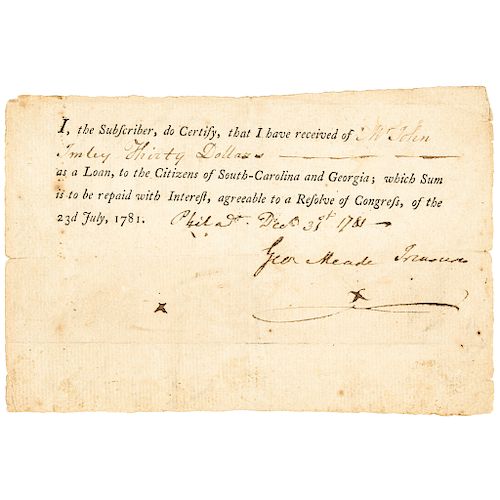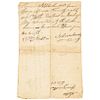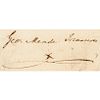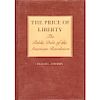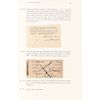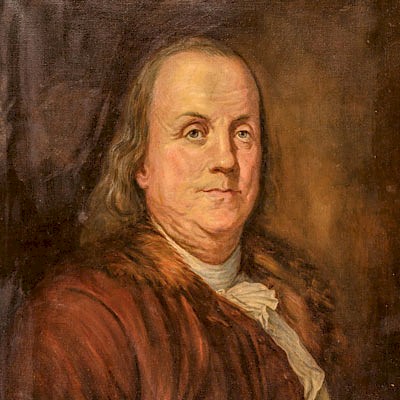UNIQUE 1781 Georgia + SC Payment Certificate Anderson The Price of Liberty US108
Lot 155
Estimate:
$8,000 - $10,000
Absentee vs Live bid
Two ways to bid:
- Leave a max absentee bid and the platform will bid on your behalf up to your maximum bid during the live auction.
- Bid live during the auction and your bids will be submitted real-time to the auctioneer.
Bid Increments
| Price | Bid Increment |
|---|---|
| $0 | $10 |
| $200 | $20 |
| $300 | $25 |
| $500 | $50 |
| $1,000 | $100 |
| $2,000 | $200 |
| $3,000 | $250 |
| $5,000 | $500 |
| $10,000 | $1,000 |
| $20,000 | $2,000 |
| $30,000 | $2,500 |
| $50,000 | $5,000 |
| $100,000 | $10,000 |
| $200,000 | $20,000 |
| $300,000 | $25,000 |
| $500,000 | $50,000 |
About Auction
By Early American History Auctions
Aug 24, 2019
Set Reminder
2019-08-24 12:00:00
2019-08-24 12:00:00
America/New_York
Bidsquare
Bidsquare : Autographs, Colonial Currency, Political Americana, Historic Guns
https://www.bidsquare.com/auctions/early-american-history-auctions/autographs-colonial-currency-political-americana-historic-guns-4347
Historic Autographs • Colonial Currency • American Civil War Colonial Era • Revolutionary War • Political Americana • Black History Early American History Auctions auctions@earlyamerican.com
Historic Autographs • Colonial Currency • American Civil War Colonial Era • Revolutionary War • Political Americana • Black History Early American History Auctions auctions@earlyamerican.com
- Lot Description
American Revolution
1781 Unique Continental Congress Emergency Loan to South Carolina and Georgia This Loan Certificate is Listed by William Anderson in "The Price of Liberty" as US 108
December 31, 1781 Hand-Dated Revolutionary War Period, Partly-Printed Document Signed, "George Meade," as Treasurer, Continental Congress Loan Certificate and Interest Guarantee, for Citizens of Georgia and South-Carolina under Duress and Driven away by the British Forces, Anderson US-108, likely Unique Receipt at Philadelphia, Choice Very Fine.
December 31, 1781-Dated Revolutionary War Period, The Anderson reference: "The Price of Liberty" Plate Illustration, page 91, Anderson US 108, authorized July 23, 1781, listed as (1 to 3 known) Rarity-8. No other example is known to this cataloger. This example is most likely Unique being the first and only example we have encountered of this Continental Congress Loan Office Form. This Partly-Printed Fiscal Loan Document to pay Interest Signed, "Geor(ge) Meade Treasurer" and measures about 6.25" x 4", 1 page, at Philadelphia. This Emergency Loan was to be repaid by South Carolina and Georgia, but it was "Guaranteed by Congress (JCC, 21: 782-83). This exact note is the illustration piece in Anderson as provided then by Earl E. Moore. This being Certificate issued per the Resolves of Congress, (See: Journals of Congress, page 782) Being a receipt that reads, in full:
"I, the Subscriber, do Certify, that I have received of Mr John Imley Thirty Dollars as a Loan, to the Citizens of South-Carolina and Georgia, which Sum is to be repaid with Interest, agreeable to a Resolve of Congress, of the 23d July, 1781. Phila. Decb 31st 1781". Statement on reverse reads, "Received 9 September 1785 from George Meade Twenty eight and 72/90th Dollars in part of my subscription to the Carolina loan for which I have given true receipts - 28 72/90 Dolls - John Imley".
"Resolved, That [five suitable persons] be appointed and authorised to open a subscription for a loan of [thirty thousand] dollars, for the support of such of the citizens of the states of South Carolina and Georgia, as have been driven from their country and possessions by the enemy, the said states, repsectively, by their delegates in Congress, pledging their faith for the re-payment of the sums [so lent,] with interest, [in proportion to the sums which shall be received by their repsective citizens, as soon as the legislatures of said states shall severally be in condition to make provision for so doing], and Congress hereby guaranteeing this obligation: That the said [five persons] do also receive voluntary and free donations, to be applied to the [further relief] of said sufferers.
Ordered, That the President (of Congress) send a copy of the above resolution to the executives of the several states not in the power of the enemy, requesting them to promote the success of said loan and donation in such way as they shall think best."
George Meade was born February 27, 1741 in Philadelphia and was a noted merchant. In 1765 he was a Signer of the "Non-Importation Agreement." In 1772 he formed Meade & Co. an import company. In 1775 enrolled in the Third Battalion of Associators. In 1776 Meade was on various relief committees, committees of correspondence, and for citizens food supplies brought into the city. Upon the approach of the British to Philadelphia he abandoned the city, but returned in 1778 and resumed his business. In 1780 George Meade & Co. subscribed 2,000 to the bank organized for supplying the Continental Army with provisions. It was about this timeframe that this Unique Loan Certificate was issued, "which Sum is to be repaid with Interest, agreeable to the Resolve of Congress, of 23rd July, 1781."
This Emergency Loan was to be later repaid by South Carolina and Georgia, but it was "Guaranteed by Congress". Accounts of the exodus showed some citizens without a penny for food begging the British intendant to sell some of the furniture from their confiscated homes so they wouldn't starve on their deportation trip.
The banished families were of the Continental and militia soldiers and officers who refused the protection of the Crown. There are accounts of those who accepted protection rejoining the patriot forces at their first opportunity. Many not accepting protection were separated from their families and exiled to St. Augustine. 147 were commited prison ships.
On June 23, 1781 the Commandant, not wanting the burden of caring for the families in Charlestown any longer ordered the families of the men exiled to St. Augustine as well. A prisoner exchange was arranged for Aug. 1, 1781 in Jamestown. Those deported from Charlestown and St. Augustine left on a series of ships hired for their removal.
Many of the men who landed at Jamestown, Va. headed immediately for camp and rejoined the army. Others accompanied their families on to Philadelphia. Many of the prominent exiled families were taken in by like Philadelphia families and created long lasting social ties between Charlestown and Philadelphia.
When the British were shortly expelled from South Carolina/Georgia Governor Rutledge retaliated against the loyalists banishing them from their homes, creating a wretched existence for them in a refugee colony outside Charlestown called Rawdontown.
After the British lost the territory the homeowners reclaimed their property and possessions that were locatable. The original congressional resolution provides that once the territory was reclaimed and the patriot government reinstalled, "the said states shall severally be in condition" to guarantee to repay this loan, something they couldn't do since the territory was occupied by the British at the time of the original resolution.
Congress guaranteed $30,000. Any amount to help was acceptable, even more as some was freely donated in this case anyway. More than likely George Meade acted as a go between in reimbursing the lenders when the loan was repaid.
The early method of selling limited amounts of stock, lottery tickets, bonds, and loans was to provide each selling agent with a limited amount to sell, all agents together totalling the desired amount. This was the beginning of what is referred to today on Wall Street as Syndication. One firm, or person, George Meade in this case, is responsible for keeping the overall books.
- Shipping Info
-
Early American provides in-house worldwide shipping. Please contact us directly if you have questions about your specific shipping requirements.
-
- Buyer's Premium



 EUR
EUR CAD
CAD AUD
AUD GBP
GBP MXN
MXN HKD
HKD CNY
CNY MYR
MYR SEK
SEK SGD
SGD CHF
CHF THB
THB